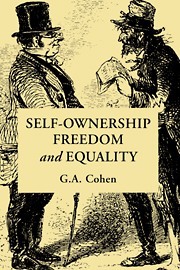Book contents
- Frontmatter
- Contents
- Preface
- Acknowledgements
- Introduction: history, ethics and Marxism
- 1 Robert Nozick and Wilt Chamberlain: how patterns preserve liberty
- 2 Justice, freedom, and market transactions
- 3 Self-ownership, world-ownership, and equality
- 4 Are freedom and equality compatible?
- 5 Self-ownership, communism, and equality: against the Marxist technological fix
- 6 Marxism and contemporary political philosophy, or: why Nozick exercises some Marxists more than he does any egalitarian liberals
- 7 Marx and Locke on land and labour
- 8 Exploitation in Marx: what makes it unjust?
- 9 Self-ownership: delineating the concept
- 10 Self-ownership: assessing the thesis
- 11 The future of a disillusion
- Bibliography
- Index of names
- Subject index
10 - Self-ownership: assessing the thesis
Published online by Cambridge University Press: 29 August 2009
- Frontmatter
- Contents
- Preface
- Acknowledgements
- Introduction: history, ethics and Marxism
- 1 Robert Nozick and Wilt Chamberlain: how patterns preserve liberty
- 2 Justice, freedom, and market transactions
- 3 Self-ownership, world-ownership, and equality
- 4 Are freedom and equality compatible?
- 5 Self-ownership, communism, and equality: against the Marxist technological fix
- 6 Marxism and contemporary political philosophy, or: why Nozick exercises some Marxists more than he does any egalitarian liberals
- 7 Marx and Locke on land and labour
- 8 Exploitation in Marx: what makes it unjust?
- 9 Self-ownership: delineating the concept
- 10 Self-ownership: assessing the thesis
- 11 The future of a disillusion
- Bibliography
- Index of names
- Subject index
Summary
Seizing the results of someone's labour is equivalent to seizing hours from him and directing him to carry on various activities. If people force you to do certain work, or unrewarded work, for a certain period of time, they decide what you are to do and what purposes your work is to serve apart from your decisions. This process whereby they take this decision from you makes them a part-owner of you; it gives them a property right in you.
(Robert Nozick, Anarchy, State, and Utopia)1. As I said in section 1 of Chapter 3, it is an initially attractive strategy, for egalitarians, to grant libertarians the premiss of self-ownership and then, by insisting on equality of raw worldly resources, to deny the libertarian conclusion that equality of condition contradicts justice. But, as I also said in Chapter 3, and as I demonstrated in Chapters 4 and 5, that strategy will not succeed, and egalitarians are therefore obliged to criticize the thesis of self-ownership itself. It is, however, difficult to criticize it in a non-question-begging way. Thus, for example, it is, in my opinion, a considerable objection to the thesis of self-ownership that no one should fare worse than others do because of bad brute luck, for no luck is bruter than that of how one is born, raised and circumstanced, the good and bad results of which adhere firmly to individuals under the self-ownership principle.
- Type
- Chapter
- Information
- Self-Ownership, Freedom, and Equality , pp. 229 - 244Publisher: Cambridge University PressPrint publication year: 1995
- 1
- Cited by

